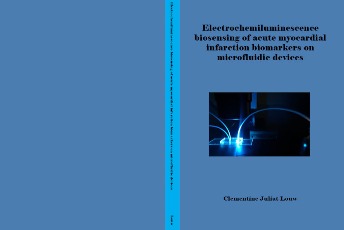PhD defence C.J. (Clementine) Louw

Electrochemiluminescence biosensing of acute myocardial infarction biomarkers on microfluidic devices
Immunosensors play an important role in the early diagnosis of many diseases because they are sensitive, specific, and rapid, exhibit low detection limits, and are cost effective. Furthermore, immunosensors can be made portable by integrating them with microfluidic networks to develop point-of-care devices that can be used close to the patient or in a doctor’s office. In this work, an immunosensor was fabricated for early diagnosis of cardiovascular disease, namely acute myocardial infarction (AMI). AMI is a heart condition that occurs when there is a blockage of blood flow to the heart. Early detection of AMI is crucial to ensure timely assistance for the patient, reduced medical costs and shortened prognosis timelines. The early detection of biomarkers, molecules whose concentrations change markedly with the onset of disease, is one of the best ways to diagnose diseases such as AMI. Cardiac troponin I was used as the biomarker in this research, as it is known as the gold standard biomarker for AMI diagnosis because it is more sensitive and specific compared to other cardiac markers. If a patient with elevated levels of cardiac troponin I is left untreated, they are at a high risk for heart failure or even sudden death. Prompt identification and intervention are thus essential. The aim of this research project was to fabricate a label-free immunosensor for detection of cardiac troponin I and further integrate it into a microfluidic device for early diagnosis of AMI. Electrochemical and electrochemiluminescence techniques were used for detection of cardiac troponin I.
|
Promotors:
|
prof. dr. E.M.J. (Sabeth) Verpoorte, prof. dr. P. Baker
|
